Background
Born to a modest Alawite farming family in January 1930, Adonis hails from the village of al-Qassabin near the city of Latakia in western Syria.


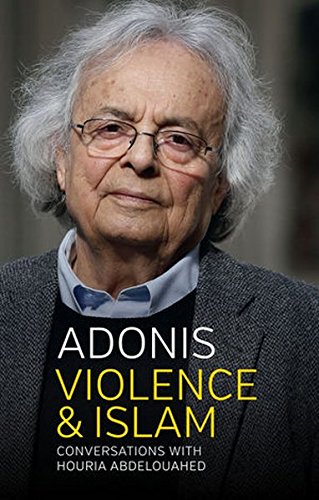
( Adonis� influence on Arabic literature has been liken...)
Adonis� influence on Arabic literature has been likened to that of T. S. Eliot in the English-speaking world. Yet alongside this spearheading of a modernist literary revolution, the secular Syrian-born poet is also renowned for his persistent and staunch attacks on despotism across the Arab world. In these conversations with the psychoanalyst Houria Abdelouahed, Adonis brings into sharp relief the latest wave of violence and war to engulf Arabic countries, tracing the cause of ongoing tensions back to the beginnings of Islam itself. Since the death of the prophet Muhammad, Islam has been used as a political and economic weapon, exploiting and reinforcing tribal divisions to aid the pursuit of power. Adonis argues that recent events in the Middle East � from the failures of the Arab Spring to the rise of ISIS and the bloody war in his native Syria � attest to the destructive effects of an Islamic worldview that prohibits any notion of plurality and breeds violence. If there is to be any hope of peace or progress in the Arab world, it is therefore imperative that these mentalities are overcome. In their place, Adonis urges a new spirit of enquiry, embodied in the freedoms to interrogate the past and to question cultural norms. Adonis� penetrating analysis comes at a critical time, offering an alternative path to the cycle of violence that plagues the Arab world today.
http://www.amazon.com/gp/product/1509511903/?tag=2022091-20
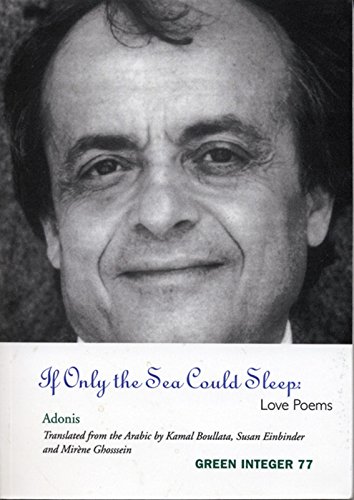
( One of the greatest poets of Arab literature, Adoniss ...)
One of the greatest poets of Arab literature, Adoniss work often centers on the process of poetic creation, but his work has somehow remained highly appealing to Arab readers, and his has had, perhaps, more influence in terms of innovation and modernity than any other contemporary Arab poet. Twice he has been a finalist for the Nobel Prize. For Adonis, poetry is a vision (ruya") a "leap outside of established concepts, a change in the order of things and in the way we look at them." Selected from Al-Amul al Shiriyya, 1-3 (The Complete Works, 3 volumes) the current book explores the great Syrian poets oeuvre more than any other previous collection in English.
http://www.amazon.com/gp/product/1931243298/?tag=2022091-20
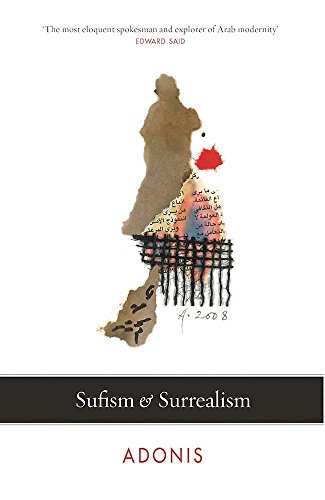
(The Arab world s greatest living poet The New York Times ...)
The Arab world s greatest living poet The New York Times Adonis is one of the most important major literary figures of our century His vision is extraordinary his poetry sublime a master of our times V S Naipaul At first glance Sufism and Surrealism appear to be as far removed from one another as is possible Adonis however draws convincing parallels between the two contesting that God in the traditional sense does not exist in Surrealism or in Sufism and that both are engaged in parallel quests for the nature of the Absolute through holy madness and the deregulation of the senses This is a remarkable investigation into the common threads of thought that run through seemingly polarised philosophies from East and West written by a man Edward Said referred to as the most eloquent spokesman and explorer of Arab modernity Adonis is one of the most celebrated poets and essayists of the Arab world Born in Syria in 1930 he fled political persecution and settled in Lebanon in the 1950s where he led the modernist movement in Arabic poetry He has written more than thirty books in Arabic including the pioneering work An Introduction to Arab Poetics and was awarded the Goethe Prize in 2011 for his contribution to international literature His other awards include the Spiros Vergos Prize for Freedom of Expression the Bjrnson Prize the International N zim Hikmet Poetry Award and the Syria Lebanon Best Poet Award The Arab world s greatest living poet The New York Times Adonis is one of the most important major literary figures of our century His vision is extraordinary his poetry sublime a master of our times V S Naipaul At first glance Sufism and Surrealism appear to be as far removed from one another as is possible Adonis however draws convincing parallels between the two contesting that God in the traditional sense does not exist in Surrealism or in Sufism and that both are engaged in parallel quests for the nature of th
http://www.amazon.com/gp/product/0863561896/?tag=2022091-20
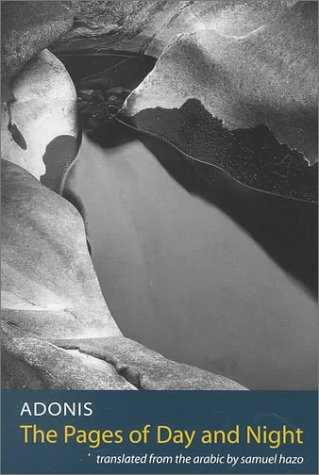
( Calling poetry a "question that begets another question...)
Calling poetry a "question that begets another question," Adonis sets into motion this stream of unending inquiry with difficult questions about exile, identity, language, politics, and religion. Repeatedly mentioned as a possible Nobel laureate, Adonis is a leading figure in twentieth-century Arabic poetry. Restless and relentless, Adonis explores the pain and otherness of exile, a state so complete that absence replaces identity and becomes the exile's only presence. Exile can take many forms for the Arabic poet, who must practice his craft as an outsider, separated not only from the nation of his birth but from his own language; in the present as in the past, that exile can mean censorship, banishment, or death. Through these poems, Adonis gives an exquisite voice to the silence of absence.
http://www.amazon.com/gp/product/0810160811/?tag=2022091-20
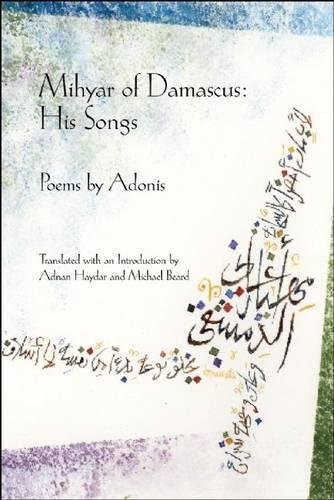
( Born in Syria in 1930, Adonis later moved to Lebanon an...)
Born in Syria in 1930, Adonis later moved to Lebanon and became a pivotal figure in the new poetry of the late 1960s. With the publication of Mihyar of Damascus: His Songs in 1963widely viewed as a watershed moment in Arabic poetryAdonis forged a new set of possibilities for Arabic poetry, writing in traditional meters but infusing them with modernist rhythms, styles, and conceptual complexities. Translators Adnan Haydar (University of Arkansas in Fayetteville) and Michael Beard (University of North Dakota) co-edit a series of books, Middle East Literature in Translation, for Syracuse University Press.
http://www.amazon.com/gp/product/1934414085/?tag=2022091-20
Born to a modest Alawite farming family in January 1930, Adonis hails from the village of al-Qassabin near the city of Latakia in western Syria.
He was unable to afford formal schooling for most of his childhood, and his early education consisted of learning the Quran in the local kuttab (mosque-affiliated school) and memorizing classical Arabic poetry, to which his father had introduced him.
In 1944, despite the animosity of the village chief and his father’s reluctance, the young poet managed to recite one of his poems before Shukri al-Quwatli, the president of the newly-established Republic of Syria, who was on a visit to al-Qassabin. After admiring the boy’s verses, al-Quwatli asked him if there were anything he needed help with. ‘‘I want to go to school, ’’ responded the young poet, and his wish was soon fulfilled in the form of a scholarship to the French lycée at Tartus. The school, the last french Lycée school in Syria at the time, was closed in 1945, and Adonis was transferred to other national schools before graduating in 1949. He was a good student, and managed to secure a government scholarship. In 1950 Adonis published his first collection of verse, Dalila, as he joined the Syrian University (now Damascus University) to study law and philosophy, graduating in 1954 with a BA in philosophy. He later earned a doctoral degree in Arabic literature in 1973 from Saint Joseph University.
In 1960-1961, at a crucial stage in his intellectual development, he received a scholarship which enabled him to study in Paris.
After a six-month spell of imprisonment in Syria in 1955 because of his political activities and membership in the Syrian National Socialist Party, he escaped to Lebanon to settle there in 1956, becoming a Lebanese national.
Adonis wrote extensively during this time. His poetry represented an attempt to create a fusion of his early influences, as he tried also to give poetic expression to his political and social beliefs. These urgings included the quest for national identity and the powerful drive to achieve the "great leap forward" of Arab society.
In 1957, at a significant point in the development of what was called the New Poetry, he joined another poet, Yusuf al-Khal, in founding the avant-garde journal Shi'r (Poetry), which was destined to play a major role in the development of Arabic poetry. In 1968 he established the equally influential, but more culturally and politically oriented journal Mawaqif (Situations), which became the avant-garde literary magazine in the Arab world.
From 1970 to 1985 Adonis was a professor of Arabic literature at the Lebanese University. He was deeply affected by the 10 years of horror during the Lebanese civil war, as reflected in his writings. In 1973, he obtained his Doctorat d'Etat at St. Joseph University in Beirut. In 1976 he held a visiting professorship at Damascus University, and in 1980-1981 he was a professor of Arabic at the Sorbonne in Paris. In 1985 he taught for a semester at Georgetown University in the United States. He also taught at the prestigious academic institution College de France, where he lectured on Arabic poetics. He later held a professorship at the University of Geneva, where he lectured on Arabic poetry.
In this intense atmosphere of search, lust for change, and political upheavals (particularly after the struggle for Palestine and the foundation of Israel in 1948), the New Poetry began to explode, taking the form first of a rebellion against the prosodic and rhythmic system of organization which had dominated Arabic poetry from its earliest days. What became known as al-shi'r al-hurr (roughly, free verse) came into being, and Adonis's role in the evolution of this mode of writing was crucial.
The turning point in Adonis's work came with The Songs of Mihyar the Damascene, published in 1961, in which he seemed to discover the secrets of creating a balance between the social-political role assigned to poetry and the demands of a subtle, esthetically appealing, and symbolic language of absence. Adonis's poetry became richer, more dramatic, multi-voiced, more complex, and far more experimental, especially on the level of language and structure. But in the view of many, it never managed to surpass the songs of the magical Mihyar.
The most complex of his works, his 400-page Mufrad bi-Sighat al-Jam ' (Singular in the Plural Form; 1977), is a dazzling piece of writing, but one which has remained a closed, esoteric world to the majority of readers.
Adonis is both a poet and a theorist on poetry, as well as a thinker with a radical vision of Arab history and culture. This philosophy is embodied at its most provocative stage in his major work, al-Thabit wa al-Mutahawwil (The Static and the Changing), a study of conventionalism and innovation in Arabic culture. Adonis has exerted a powerful influence on thinking about poetry, creativity, change, and modernism among both his contemporaries and the younger generations of Arab poets.
His name has become synonymous with rebellion, rejection, radical writing, and modernism (expressed in Arabic by the word hadatha), which he, more than any other figure, has labored to define, preach, and provide with a powerful poetic embodiment. Such books as his Zaman al-Shi'r (The Time of Poetry) and Sadmat al-Hadatha (The Shock of Modernity) are landmarks in the history of critical contemplation in the Arab world.
Well acquainted with the Western literary traditions, especially in poetry, Adonis produced some fine and influential translations of European, and especially French, poetry. Of particular importance are his translations—or more accurately, perhaps, his Arabic renderings—of the complete poetical works of St. John Perse and the dramatic works of the French poet of Lebanese origin Georges Schehadeh.
Some of Adonis's later poetry lost much of the abstractness and cerebrality of the works he produced in the 1970s. It also lost much of the lyricism and tone of yearning of his poetry in the 1960s. He displayed a new fondness for what may be called the poetry of place, in contrast to the poetry of time that had dominated his previous work.
In 1985, Adonis wrote a provocative book of literary criticism, Al Shi riyya Al-Arabiyya (Arabic Poetics), which was published in Beirut. Adonis focused on the "dual siege" of the Arab writer, who is caught between Western thought and Islamic traditions. In 1990, Adonis wrote Introduction to Arab Poetics, published by the University of Texas.
In 1994, his book The Pages of Day and Night (translated by Samuel Hazo) was released, and it received wide-spread acclaim. Many of the poems had a distinct aura of mystical timelessness to them. The works included lyrical, fantastical, and revelatory writings.
Adonis has lived in Paris, France, since 1975.
Adonis has been described as the greatest living poet of the Arab world.
In Adonis's long writing career, he has twice been nominated for a Nobel Prize, and has published more than 20 books.
Adonis’s publications include twenty volumes of poetry and thirteen of criticism. His dozen books of translation to Arabic include the poetry of Saint-John Perse and Yves Bonnefoy, and the first complete Arabic translation of Ovid’s Metamorphoses (2002). His multi-volume anthology of Arabic poetry (Dīwān ash-shi‘r al-‘arabī), covering almost two millennia of verse, has been in print since its publication in 1964.
In 2007, Arabian Business named Adonis No. 26 in its 100 most powerful Arabs 2007.
(The Arab world s greatest living poet The New York Times ...)
( One of the greatest poets of Arab literature, Adoniss ...)
( Calling poetry a "question that begets another question...)
( Born in Syria in 1930, Adonis later moved to Lebanon an...)
( A bilingual volume of poetry presenting the work of thr...)
( Adonis� influence on Arabic literature has been liken...)
( Poetry is the quintessence of Arab culture. Adonis,a le...)
(Poetry of Ali Ahmed Said (Adonis).)
(Book by Adunis)
(New copy. Fast shipping. Will be shipped from US.)
Quotations: He said: "I am not sad about burning my books because this is an old phenomenon in our history. We are fighting to found a dialogue and a debate in a peaceful way. Founding differences in opinions is a wealth source. This counterfeiting humiliates Arabic. "
In 1983 he became a Member of the Académie Stéphane Mallarmé.
In 1990 he became a Member of Académie Universelle des Cultures, Paris.
Adonis's youthful years coincided with the years of upheaval, revolutionary fever, struggle against colonialism, and search for modernization and revival throughout the Arab world. The achievements of such figures as Kahlil Gibran (author of The Prophet) had contributed significantly to the burgeoning of a new sensibility, a fresh poetic language, and new imagery and rhythmic structures. Adonis's formative years had been strongly influenced by this new trend, as well as by his readings in European poetry. Yet he had also been educated in the classical traditions of Arabic poetry by his father, a man well steeped in classical culture and Islamic theology.
Quotes from others about the person
According to Mirene Ghossein, "one of the main contributions of Adonis to contemporary Arabic poetry is liberty-a liberty with themes, a liberty with words themselves through the uniqueness of poetic vision. "
The literary and cultural critic Edward Said, professor at Columbia University, called him "today's most daring and provocative Arab poet". The poet Samuel John Hazo, who translated Adonis's collection The Pages of Day and Night, said, "There is Arabic poetry before Adonis, and there is Arabic poetry after Adonis. "
In 2017, the judges panel for the PEN/Nabokov Award cited “Through the force of his language, boldness of his innovation, and depth of his feeling, Ali Ahmad Said Esber, known as ‘Adonis, ’ has helped make Arabic, one of the world’s oldest poetic languages, vibrant and urgent. A visionary who has profound respect for the past, Adonis has articulated his cherished themes of identity, memory and exile in achingly beautiful verse, while his work as critic and translator makes him a living bridge between cultures. His great body of work is a reminder that any meaningful definition of literature in the 21st century must include contemporary Arabic poetry. "
Adonis was married in 1956 to literary critic Khalida Said (née Saleh), who assisted in editing roles in both Shi'r and Mawaqif. They have two daughters: Arwad, who is director of the House of World Cultures in Paris; and Ninar, an artist who moves between Paris and Beirut.
